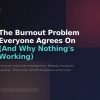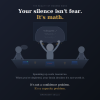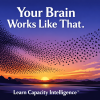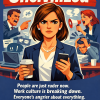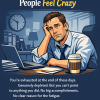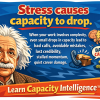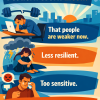You Don't Need to Find Your Purpose
(You Need to Stop Losing It)
44% of professionals report daily stress. What if "finding your purpose" isn't the problem — it's that burnout buried it? Here's how the 10 pillars and zones framework help you dig it back out.
Late. Too late to be writing this but here we are.
I'm Googling "how to find your life's purpose" again, which feels pathetic except apparently 77% of workers are disengaged so at least I'm in good company? Bad company. We're all just here. Refreshing email like it might contain the meaning of life instead of another meeting invite.
Today I spent eight hours doing... I actually can't remember. Things happened. Slack notifications. A spreadsheet. Did I eat lunch? Purpose feels like a luxury problem when you can't remember if you ate lunch. (I think I didn't.)
But here's what Cornell researchers found after studying 1,200 people over six years: the fastest route to purpose isn't looking inward. It's asking yourself what contribution you want to make — even a small one — and then making it. People who did this scored significantly higher on purpose, belonging, well-being, and feeling needed. Not months later. Eight weeks later.
The kicker? Most people (95%) chose to contribute to others, not themselves. Even Gen Z, who supposedly only care about TikTok.
Turns out the answer to "how do I find my purpose" might just be "stop looking for it and help someone else find theirs."
Writing this in Yellow Zone, which for anyone new here means my brain is technically functional but every sentence is — what was the metaphor I used last time? Shopping cart with a broken... never mind.
Here's what nobody tells you about purpose and I'm probably going to contradict this later but whatever: you already HAD one. Then work happened. Or life happened. Or 2020 happened and never really stopped happening. And now you're standing in your kitchen at 7 a.m. holding coffee wondering when exactly you turned into this person who has to Google how to care about things.
Purpose and Capacity (or: Why "Finding Yourself" Requires Executive Function You Don't Have)
Okay so. Finding your purpose when you're already fried.
First of all, it doesn't mean quitting your job to start a nonprofit in Bali, which is what every self-help book assumes you have the bandwidth to consider. It means remembering why you used to get out of bed before everything became a KPI. It means accessing the part of your brain that cared about things — back when things were
Actually wait, the 76% of workers experiencing burnout stat. That's not a personal failure that's a — sorry I lost my train of thought because I just got a Slack notification and now I'm thinking about Sunday scaries which start on Saturday now. When did that happen? Thursday maybe.
Right. Purpose.
What I've learned building this whole thing for my own ADHD brain (currently in Red Zone more than I'd like to admit): purpose isn't lost. It's buried. Under systemic garbage. Under the part where work convinced you that "engagement" means "always available" and somehow that's your fault for not having boundaries.
81% of employees want workplaces that support mental health. Not because we're weak. Because we're actively drowning.
McKinsey has a word for it — disengagement — which sounds clinical and manageable. I call it the "opened my email and forgot I'm a person with interiority" experience. Less catchy. More accurate.
(Quick Framework Thing — Skip If You're Too Tired)
Okay I'm supposed to explain that this is a "Mixed Route" problem but honestly if you're here because you can't find your purpose, frameworks might be the last thing you want to hear. So here's the short version and you can ignore it:
Personal stuff (what we call ND Route or Bias Route depending): Your executive function is completely shot. Yellow Zone, Red Zone, whatever — the point is you literally cannot access the brain parts that think about "meaning" and "values" when your nervous system is just trying to make it to 5 p.m. without a breakdown.
Systemic stuff (the Route I probably should've started with): Companies are losing $8.8 trillion to low engagement — that's 9% of global GDP which is genuinely insane — and they're somehow still acting like the problem is that you need better time management. The disengagement isn't a bug in the system. The system is DESIGNED this way. Extract productivity, offer pizza parties, repeat.
So if you can't find your purpose maybe start by being furious that you have to find it in the first place while working 50-hour weeks in a "culture of excellence" which is corporate for "we're understaffed and calling it opportunity."
Did I explain Mixed Route? I think I forgot to. It means both. Personal and systemic. Your brain AND the machine.
Moving on.
The 10 Pillars Thing (I'm Going to Lose Steam Halfway Through This)
Built these because every personal development framework assumed I had bandwidth. "Journal for 20 minutes every morning!" Cool, I haven't had 20 uninterrupted minutes since probably 2019? 2018? Time isn't real anymore.
The pillars aren't about finding purpose. They're about building enough capacity to remember you're allowed to have one in the first place.
Here's what they actually do when you're already half-dead:
Pillar 1: Stress Mastery
You can't think about purpose when cortisol is screaming.
Yellow Zone tool: 5-minute reset. Put phone down, breathe like you're trying not to yell at your boss. Works maybe 60% of the time. Better than positive thinking which works 0% of the time.
When work follows you home, boundaries need attention.
Pillar 2: Productivity & Achievement
Redefine achievement. "Got through today without crying in the bathroom" is a win.
85% of job success is human skills not technical skills which means the skill here is literally just not imploding. That counts.
If you're stuck in the productivity-paralysis loop, explore sustainable achievement approaches.
Pillar 3: Focus & Self-Management
Your brain isn't broken, the demands are impossible.
Task-switching makes you stupid — actual research on this — so stop trying to Slack + Zoom + report + existential crisis simultaneously. One disaster at a time. (Pick the noisiest one.)
When focus feels impossible, learn about self-management strategies that work.
Pillar 4: Confidence Under Pressure
You're not failing at purpose you're failing at breathing.
Name the catastrophizing: "spiraling because Karen wants deck changes" ≠ "life is meaningless." One is cortisol. One is philosophy. Don't confuse them.
If presentation anxiety is the issue, explore calming approaches.
Pillar 5: Emotional Mastery
76% of people say stress wrecks their mental and physical health. You're allowed to feel dead inside without making it a moral failure. You're a data point in a broken system not a personal tragedy.
Understanding emotional regulation helps separate system failures from personal ones.
(Okay I'm getting tired. Rest of these are going to be shorter.)
Pillar 7: Motivation
Dopamine = neurotransmitter, not personality flaw. If you're burned out your motivation system is literally chemically offline. You don't need manifestation you need nervous system regulation but honestly that's a whole other post and I'm not qualified to write it anyway.
$8.8 trillion lost to disengagement. Your lack of motivation isn't lazy it's rational.
Actually wait I used that stat earlier didn't I? The $8.8 trillion thing? Or was it 8-something trillion—point is, absurd. I can't remember. Too many numbers. Point stands though — you're not broken the system is broken and your "laziness" is your brain trying to protect you from a machine that will grind you down if you let it.
Or something like that. I might be contradicting myself. Earlier I said purpose isn't lost it's buried and now I'm saying motivation is chemically offline which... is that the same thing? Different thing?
Buried vs. chemically offline—both can be true. Buried is "context stole your oxygen." Offline is "brain hit the breaker." Both probably.
When burnout kills motivation, explore resilience strategies.
Pillar 8: Communication & Connection
FORD method (Family, Occupation, Recreation, Dreams) for when your social battery is at 3%. 16% of Americans feel attached to community. Structure helps when you're lonely but too tired to wing it.
Wait actually scratch that. This pillar deserves better than a technique.
Here's what the research actually shows: Cornell psychologist Anthony Burrow ran a 6-year study where he gave students $400 to "pursue what matters most" — to make a contribution to their community, family, or themselves. Before getting the money, recipients tested the same as non-recipients on well-being measures. Eight weeks later? The people who made contributions scored significantly higher on every single measure: well-being, sense of purpose, sense of belonging, feeling needed and useful, emotional balance.
The takeaway from the research: "Invite people to think about a contribution they want to make and help them make that contribution, and that person may walk around with greater purpose than if they hadn't done that."
You don't need $400. You don't need Cornell's blessing. You just need to ask yourself: what contribution do I want to make? Even a small one. Even a tired one. Even "I want to text someone who's struggling and say 'yeah, me too.'"
The Yellow Zone version of this isn't "save the world." It's "what's one thing I can contribute that would make me feel less trapped in my own head?"
Psychology professor Todd Kashdan says it perfectly: "Maybe what we need to reduce all the difficulties internally is to have people outward-focused on what do you want to do with your limited time today, this week, this month. And through that, you find yourself not obsessing so much about the chatter that's going on between your ears."
When connection feels impossible, small contributions matter more than you think.
Pillar 9: Self-Worth & Confidence
You don't hate yourself. You hate feeling this powerless. Different problem. Same exhaustion.
Yale's stress research: chronic uncertainty about your value at work rewires your brain into hyper-vigilance which feels like "I'm fundamentally flawed" but is actually "my environment is fundamentally unsafe." Your prefrontal cortex literally can't tell the difference after 18 months of this.
So when your boss says "let's circle back on your performance" and you spiral into "I should just quit and live in the woods" — that's not a personality flaw. That's biology screaming "THREAT DETECTED, ACTIVATE ALL DEFENSE SYSTEMS." Including the one that makes you hate yourself preemptively before anyone else can do it first.
This is where self-worth work starts — not with affirmations but with recognizing your nervous system is just doing its job (poorly, but with good intentions).
Pillar 10: Rest & Recovery
You're not being lazy you're being mammalian. Sleep matters. Downtime matters. The part where you stare at walls matters.
But here's where it gets messy: you can't rest when your nervous system thinks rest = vulnerability = death. So "just take a break" doesn't work when your body reads "break" as "opportunity for predators to strike."
This is why people scroll Instagram for three hours but can't nap for 20 minutes. Instagram feels safer. At least you're monitoring threats (everyone's life looking better than yours). A nap? That's lowering your guard.
Real rest and recovery requires convincing your nervous system that rest won't kill you. Which is harder than it sounds when work emails arrive at 9 p.m. labeled "quick question."
I had a better way to say this earlier. Can't remember now.
Where This Fits (The Path Thing I Probably Should Explain Better)
This post is Reset phase — that's the 30-minute to 30-day span where you stop free-falling. Where you remember you're allowed to have needs even if meeting them feels impossible right now.
Actually wait. Is it Reset or Build? I keep mixing up my own framework which is either funny or concerning. Reset is about stabilizing. Build is about structure. This post feels like both? Or neither?
Let's say Reset. Finding purpose isn't a Thrive problem anyway. It's a "stop actively destroying yourself first" problem.
The Path (simplified because I'm losing coherence):
- Reset — Stabilize before you collapse. This is where you are. Where I am. Where most of us are honestly.
- Build — Connect the pillars into actual routines that don't fall apart immediately. (Not there yet.)
- Thrive — Purpose becomes accessible because you built infrastructure to hold it. (Sounds fake but apparently possible.)
Data says teams with high engagement show +23% profit and -43% turnover. Great for them. What it means for you: when you stop running on fumes you get better at your job AND might remember why you wanted it.
Maybe.
Sometimes.
Purpose isn't the destination though. Capacity is. Purpose just lives there if you have room for it.
Did I already say that earlier? I think I'm repeating myself. That's fine. Repetition is fine. We're in Yellow Zone nobody's grading this.
i don't know how to end this
Could wrap it up with a bow. Tell you the 10 pillars fix everything. Wake up tomorrow with clarity about life's work and purpose and meaning.
But that would be lying.
What I actually know: Purpose isn't a lightning bolt. It's more like... breadcrumb trail you follow when you're finally not drowning. When your head's above water long enough to look around and remember what direction you were even trying to go.
The 10 pillars don't give you purpose. They give you bandwidth to notice you're allowed to have one. And sometimes that's enough.
Sometimes purpose is just:
- I ate a meal that tasted like something
- I didn't spiral in the shower
- I remembered for five minutes that I used to like things
- I made it to Thursday
- I asked myself "what contribution do I want to make" and then made it, even if it was tiny
That last one matters more than the entire self-help industry wants you to know.
The Cornell research is unambiguous: Purpose doesn't come from journaling about yourself. It comes from asking "what do I want to contribute" and then contributing it. Even small. Even imperfect. Even when you're exhausted.
Psychology professor Kendall Cotton Bronk puts it plainly: "So much of pop psychology is 'focus on yourself, your personal growth, your needs, your self-care, you, you, you.' Instead, the real path to happiness is focusing on others, on how you can contribute to others and their well-being."
Purpose isn't about finding yourself. It's about finding someone else who needs what you've learned from being this tired and this lost.
Start there.
Or don't start anywhere. Just exist for a bit. That's allowed too.
The rest can wait. Everything can wait. Including this conclusion which I'm not sure how to finish so I'm just going to stop typing and hope it feels intentional instead of like I ran out of steam.
Which I did.
Obviously.
What to Do Now (If You Even Want To Do Anything)
Option 1: Answer the Cornell question
Before you do anything else, answer this: What contribution do you want to make? To your community, family, or yourself. Even if it's small. Even if it feels impossible right now. Write it down. That's the exercise that changed well-being scores in 8 weeks.
Then ask: what's one tiny step I could take toward that this week?
That's it. That's the whole thing.
Option 2: Free 30-minute reset thing
No credit card no upsell. Just you and a process and maybe you stabilize a bit before the next meeting. Maybe not. Worth trying.
Option 3: Look at the pillars
See how they connect to your Route (ND, Bias, Systemic, Mixed — honestly if you're not sure just pick one and adjust later). Figure out what Zone you're in. Or don't. You probably already know.
Or: ignore all this and text one person you actually like. That counts.
Option 4: Do nothing
Close this tab. Make tea. Sit there for 90 seconds without optimizing anything or feeling guilty about not optimizing anything.
That's purpose too probably.
Or it's just tea.
Both fine.
Wrote this somewhere between Yellow and Red Zone. Not sure which anymore. Time stamp says 11:52 p.m. My stove clock says 6:13. One of us is lying.
Progress over perfection or whatever people say.
Related Reading
- What Is the Zones Framework? — Understand Green, Yellow, Red, and Can't-Even Zones
- The 10 Pillars of Emergent Skills — Full breakdown of each pillar and how they connect
- Why You Can't Focus (And Why It's Not Your Fault) — The executive function crisis no one's talking about
- Research Hub — All the stats cited in this piece, with links to original sources

